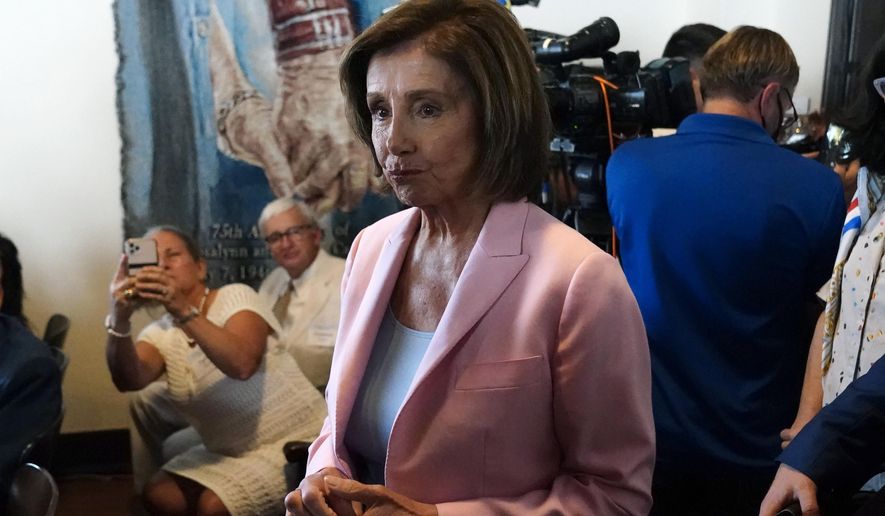Hundreds of religious freedom advocates converge on the District Tuesday for a three-day International Religious Freedom Summit aimed at cultivating a culture of liberty, said co-Chair Sam Brownback, a former Kansas governor and ambassador-at-large for International Religious Freedom.
Approximately 850 attendees are expected and seminars will also be livestreamed, said Mr. Brownback, a Republican.
The event features speeches from top figures in both parties, including former secretary of state Mike Pompeo for the Republicans and House Speaker Nancy Pelosi for the Democrats.
Mr. Brownback said global peace depends on religious freedom.
“I hope the foreign policy community is starting to see the value of this topic, that either we’re going to guarantee religious freedom for everybody, or we will have the clash of civilizations take place,” the former congressman, who served in the U.S. Senate and the House of Representatives, said in a video interview.
Bipartisanship and multi-faith action appear to be watchwords for the event.
Joining Mr. Brownback as a summit co-chair is Democrat Katrina Lantos Swett, a former chair of the U.S. Commission on International Religious Freedom.
More than 30 faith traditions will be represented at the summit, organizers said, with speakers ranging from the Dalai Lama, who recorded a video greeting, to Roman Catholic Cardinal Timothy Dolan of New York, and Pakistani Christian Asia Bibi, released from a death sentence after an international human rights campaign. Rabbi David Saperstein, also a former U.S. ambassador for International Religious Freedom, is expected to speak.
Kathy Ireland, a supermodel who’s turned her celebrity into an international merchandise brand, will be honored at the event for her efforts on behalf of persecuted Yazidis in Iraq.
The conference is not a successor to the two State Department-sponsored ministerial gatherings on the topic held during the Trump administration, but rather a shift from the governmental sphere to that of citizen action, Mr. Brownback said.
The new event “should stand on its own and the civil society groups that are willing to get behind it to stand on its own, and push for it,” he said, adding, “We’re moving it out to civil society, where the people are on this topic. This is their topic. And we want this to be an annual event led by civil society, so it’s not dependent on who’s in the White House or State Department.”
According to summit co-chair Ms. Lantos Swett, moving the event into the private sphere will “broaden the universe of actors who care about international religious freedom by making this a civil society summit.”
She said such an event “would include leaders from government, but would really begin to empower civil society, empower faith communities, empower a whole bunch of sectors … to really take up the cause for themselves.”
Both leaders said they hoped the new event would “become the Davos” of global religious liberty, shorthand for the annual World Economic Forum conferences in the Swiss city where global leaders gather to discuss issues. By holding a summit specifically tailored to religious liberty, organizers hope to focus world attention on an issue regularly grabbing headlines.
In its 2021 report documenting developments on the global religious freedom front in the previous year, USCIRF recommended 14 nations for listing as “countries of particular concern,” or CPCs, because the nations tolerate or engage in “systematic, ongoing, and egregious violations” of religious liberty. Ten of these, Burma, China, Eritrea, Iran, Nigeria, North Korea, Pakistan, Saudi Arabia, Tajikistan, and Turkmenistan, were designated as CPCs by the State Department. Four others, India, Russia, Syria, and Vietnam, were not.
“We are certainly facing a growing number of countries where communities of faith and people of conviction face a tremendous range of threats and challenges,” Ms. Lantos Swett, who runs The Lantos Foundation for Human Rights & Justice, a memorial to her late father Rep. Tom Lantos (D-Calif.), a Holocaust survivor who championed human rights during his 30 years in Congress.
She listed a number of hot-button issues, including China’s persecution and mass incarceration of the Uyghur Muslims in the country’s Xinjiang Autonomous Region. The situation facing Myanmar’s Rohingya Muslim minority. Others facing threats she said include Tibetan Buddhists, Pakistan’s Ahmadiyya Muslim Community and China’s Falun Gong minority. Also at risk, she said, are “the numbers of original, almost founding, Christian communities in the Middle East that are under such incredible persecution and threat.”
Mr. Brownback, whose championing of international religious freedom goes back to the early 2000s and his days in the Senate — “I’m still beating a dead horse,” he said — concedes the issue is a recurring one.
“You’re either going to guarantee religious freedom for everybody, and religious minorities in particular, or you’re going to have a bunch of genocides,” he said.
• Mark A. Kellner can be reached at mkellner@washingtontimes.com.




Please read our comment policy before commenting.